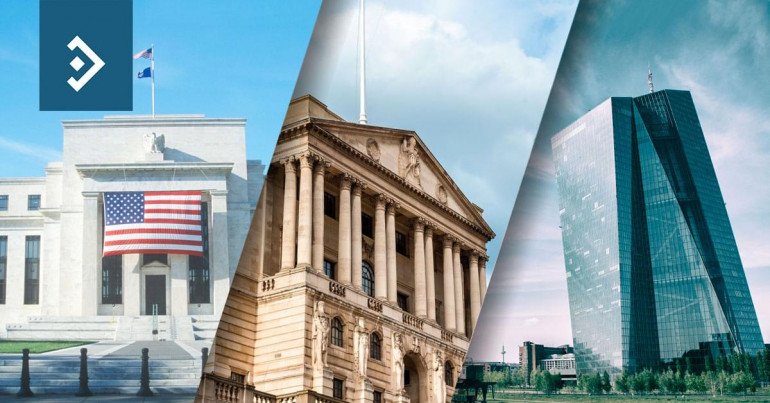
Wait and See on interest rates
Morning mid-market rates – The majors
15th October: Highlights
- Government to prioritize Economic Growth over Environmental considerations
- FOMC members out in force
- Difference of opinion over German growth
Raising rates to counter inflation may be counterproductive
The jury is still out on whether Sunak will be ordered by the Prime Minister to provide any form of support to those business sectors or even individual companies worst hit by the crisis in the wholesale gas market.
Sunak has made it clear to his colleague, business secretary Kwasi Kwarteng that if the final decision was his, the Government would acknowledge the situation but not commit any more funds in support.
Johnson, who still likes to be all things to all men, despite his own limitations, may well side with Kwarteng when he returns from holiday, and order Sunak to provide some form of emergency relief.
It has been said before that Johnson likes to paint in broad strokes, leaving what he considers to be the details to his Ministers. Unfortunately, claiming that the post-Brexit revolution in the economy has already begun and that means that crises like the HGV driver shortage are a cost of this process, requires a lot more thought and consideration.
Silvana Tenreyro has been an effective member of the Bank of England’s Monetary Policy Committee for more than four years. She has not made many headline grabbing speeches but has been quietly effective when she has spoken in public.
In an interview this week, she spoke of the pointlessness of raising interest rates to counter inflation, calling the measure ineffective.
Tenreyro believes that further study is necessary to fully appreciate the transitory nature of the current spike in inflation before even a discussion about rate increases can take place. Bank of England Governor Andrew Bailey has changed his tune somewhat in the last week, acknowledging that the rising inflation may be a factor in the economy for some time to come.
The pound continues to hold onto recent gains. It rose to a high of 1.3689 versus the dollar yesterday, closing at 1.3673.
Considering your next transfer? Log in to compare live quotes today.
Future inflation indicator appears to support gradual decline
Yesterday, the data for producer price rises in the U.S. was released. It showed that while still higher than has been seen for a considerable time, the rise appears to be beginning to abate somewhat.
In September, producer prices rose by 6.8% year-on-year. Although this was higher than the rise of 6.7% seen in August, it was below analyst’s predictions of a rise of 7.1%.
While the rate of change appears to possibly be slowing, this was still the biggest single month rise in 11 years. It follows closely on the heels of a 13-year high in consumer prices seen the previous day.
The month-on-month rise was 0.5%, lower than seen in August. As the Fed often comments, one piece of data is not generally significant, and they will wait for a trend to be established before making any comment.
There was no shortage of comment on other matters yesterday from FOMC members.
St. Louis Fed President James Bullard commented that he remains concerned about inflation, saying that there is not a strong case for inflation to dissipate over the next six months. His colleague, Mary Daly from San Francisco, said in an interview with CNN that while the FOMC may be ready to begin the taper of support for the economy, it is premature to talk about interest rate rises.
Finally, Atlanta Fed President continues to believe that the current rise in inflation is transitory, saying that he doesn’t see any change to the longer run outlook,
The dollar index is taking the likelihood of the beginning of the withdrawal of support being announced in a little over two weeks, and it may be suffering a slow-burn version of buy the rumour sell the fact.
Yesterday, the index fell to a low of 93.76, closing at 93.98. This correction could see a low between 93.40 and 93.50 unless new factors are introduced.
Gas price out of Central Bank control
While inflation is allowed to rise above its 2% target in a symmetrical manner, support for the economy will remain in place for as long as it takes to obtain consistent growth.
Lagarde looks a t the economy of the Eurozone as a single unit, so it is difficult to reconcile the concerns being expressed in countries like Germany, which are seeing far higher levels of inflation than others.
There is something of a difference of opinion being voiced over German growth prospects for the third quarter.
In its latest report, the German Economy Ministry commented that it expects growth in the third quarter GDP to be. significant. However, Germany’s top research institute has slashed its estimates for the same period.
Klaas Knot, the head of the Dutch Central Bank, spoke yesterday of the ECB’s plans to begin the tapper of support for the economy. Knot is a member of a group of more hawkish members of the Council, so some of his comments may be wishful thinking.
Knot spoke of risks to inflation being tilted to the upside. He sees the upside risk being created by supply bottlenecks and wage demands increasing. Options are being weighed to ease the transition out of PEPP.
Christine Lagarde is confident that inflation remains transitory. She spoke yesterday of the increased level of confidence being seen that the upswing in the economy is broadly balanced. This view conflicts with that expressed by Knott.
It is certain that analysts will get a chance to see who is right, as there is unlikely to be any change in policy ahead of the end of the current round of support next march.
The euro is still in a corrective phase, with sellers lining up to sell into any significant rally.
Yesterday, it rose to a high of 1.1624, closing at 1.1596.

About Alan Hill
Alan has been involved in the FX market for more than 25 years and brings a wealth of experience to his content. His knowledge has been gained while trading through some of the most volatile periods of recent history. His commentary relies on an understanding of past events and how they will affect future market performance.”



